Workers in red-and-white gingham dresses. The ice cream cones and sundaes and rich, sweet milkshakes. If you know anything about Cruze Farm, these are the images that probably come to mind. Behind the uniforms and the signature soft serve, there’s a multilayered love story—love for family, love for the work, and love for community. Sometimes, like a triple-decker cone, the story gets messy. But it’s always satisfyingly good.
The love story of Colleen Cruze (’11) and Manjit Bhatti (’06, ’09) started in the kitchen of Bistro at the Bijou in downtown Knoxville. Bhatti was working the grill when Cruze strode into the kitchen, asking why they weren’t buying any of the dairy products from her family’s farm.
“Everybody was turned around talking to me, except for him,” Cruze remembers. “He was just dancing and cooking.”
Cruze did make the sale. But her grand entrance was a ruse. Then a junior studying agricultural science at UT, she was in the middle of a challenge from her mother, Cheri, to go on 10 first dates—a way to have a little fun and figure out what she really wanted in a partner before graduating. She had already gone on six when she saw Bhatti and decided that he would
be number seven.

Manjit Bhatti and Colleen Cruze on the Cruze family dairy farm.
People like Cruze who grow up on dairy farms learn quickly to respond creatively to the unexpected. When Bhatti didn’t pay attention, she was unfazed. She persuaded a waitress to write his name and number on her receipt and that night sent Bhatti a text complimenting his cooking and inviting him to a friend’s birthday party. Date number seven ended up being Cruze’s last first date. The next day she picked him up in the farm’s milk truck, with an apple and bottle of buttermilk in hand, to help her make deliveries in Chattanooga.
“That trip was when we probably started to feel like we were falling in love,” Cruze says.
At first, the possibilities made her nervous. Bhatti was a city boy from Nashville, the son of Indian Punjabi immigrants who had spent his college years at UT studying history and German language and literature. And Cruze saw no future for herself that didn’t involve going back to the farm to help with the family business. Her dad, Earl (’79)—a fourth-generation dairy farmer who bought the plot of land in East Knox County where Cruze Farm now sits and built it from the ground up with the help of his wife, Cheri—had already told her straight: “Don’t think you’re gonna get married and bring someone in here to take over my farm.”
“Getting married, having a family, and staying in the family business—I thought it was
impossible,” Cruze says. “When I met Manjit, it wasn’t like I thought: My dad is gonna love him. It was like I fell in love, maybe it’ll all work out.”
The summer before they announced themselves as a couple, Cruze hired Bhatti to cook burgers and Indian food on Saturdays while she sold biscuits and buttermilk at the farmers market on Market Square. Once Bhatti started helping on the farm, Earl was quick to figure out what was going on—and he gave his blessing.
“If we knew he was going to be so supportive,” Bhatti says, “I probably would’ve asked her to marry me sooner.”
In April 2013, Cruze and Bhatti were wed in Sikh and Methodist ceremonies. In the eight years since, they’ve been busy raising four children and building the Cruze Farm Dairy legacy. Beyond continuing the tradition of the family’s award winning buttermilk, they’ve opened a pizza shop and three of their own ice cream stores: on Gay Street in downtown Knoxville, on Asbury Road in eastern Knox County, and on the Parkway in Sevierville. Their soft serve, a staple of summertime date nights in the city, was named in June by Food and Wine magazine as the best ice cream in Tennessee.
The secret to their success is really no secret. It’s taken a lot of hard work and, as their company motto says, love. Plenty of it.

![]()
Work Hard, Love Harder
Bhatti expects you to laugh when you hear the motto: Work hard, love harder. He laughs about it too. When he and Cruze recently ran into an employee and asked what she was up to, she responded, “Oh, you know. Just loving harder over here.”
A lot of people hear our motto and they skip right over the work hard part. They think, ‘Working in an ice cream shop—how hard can that be?”
“They don’t factor in that this is a real working dairy farm and a small business,” says Settle, who manages the Asbury store. Cruze Farm may have grown into a destination for visitors to Knoxville, mentioned in articles in the New York Times, Eater, Tasting Table, and Atlas Obscura, but it’s still a homegrown operation. “We’re not McDonald’s or Chick-fil-A,” Settle says. “We don’t have this gigantic system for how things work.”
In 1979, when he first purchased the farm, Earl milked 25 cows on 100 acres. The herd now numbers about 300—all Jerseys that are known for producing the rich milk that makes the family’s products stand out in the market. Beyond size, however, not much is different from the early days.
“The kids were raised in a weird world,” Cheri says of Cruze and her two siblings. “Farming in Knox County was on its way out.” Today, Cruze Farm is the last dairy farm in Knox County and one of a few in the state processing and bottling its own milk.
While still a student at UT, Cruze worked to expand milk accounts, adding Magpies Bakery and Old City Java among others. But she was swimming against the tide. The family’s milk and buttermilk products paid the bills, but she wanted the business to grow. She wanted to make sure there would still be a place for her after she finished college and was ready to go back home.
![]()
Finding a Helping Hand
In 2011, Cruze was in her last semester at UT when someone encouraged her to participate in the Graves Business Plan Competition, an annual event hosted by UT’s Anderson Center for Entrepreneurship and Innovation. The competition gives undergraduate and graduate students from any major the opportunity to win start-up capital for an original business idea.
Despite not having taken any business or marketing classes, Cruze filled out an application. On the day of her presentation, Cruze showed up wearing a gingham dress and head scarf like the ones she’d seen her grandmother wear to milk the cows. “A common dilemma for dairy farmers is what to do with their surplus milk,” she explained. As a girl, she had helped her parents turn the milk into hand-churned ice cream, which they sold at the farmers market. All that equipment was still stored at the farm, untouched for more than a decade. She proposed reincorporating ice cream, a value-added product that could modernize the business and reach a larger customer base.
“She blew the judges away,” says Tom Graves, the Haslam College of Business professor who organizes the competition. “I’m old enough to remember ice cream parlors from the 1950s. The way she laid out her plan, it just reached out and enveloped you.”
He keeps a photo of Cruze and her employees, in their matching red-and-white uniforms, on the center’s wall of fame.
“She’s probably the best natural marketer I’ve worked with,” Graves says.
With the $5,000 prize, Cruze bought branded containers for the ice cream she sold at the farmers market that summer, marking the rebirth of Cruze Farm ice cream. Before long, Cruze and Bhatti were opening pop-up shops downtown. In 2017 they opened the Asbury Road store on land they purchased near the place where Cruze’s great-grandfather had once farmed. By then, Cheri and Earl had handed the dairy business over to Cruze and Bhatti.
“I’m thankful Manjit loves it,” Cruze says. “There’s so much to learn on a dairy farm. And he’s become a real student of it.”
In the years since he went to work with his wife, Bhatti has taken his love of books and knack for tinkering and poured them into learning the ins and outs of being a dairy farmer.
“Farming can be a very nerdy occupation,” Bhatti says. Beyond the obvious, like calf care and pasteurization, dairy farmers must know, to varying degrees, carpentry, electrical systems, plumbing, and operating and maintaining large machines like tractors and tanks. The job is 24/7, no days off—cows need to be milked twice daily, regardless of what goes wrong in another area of the business.
“As an outsider, I may be more likely to throw in the towel than someone like Colleen,” Bhatti says. “But you realize that for the past 60 or 80 years, whatever needs to be fixed will be fixed and has never not been fixed. They’ve got that dedication that may be hard for an outsider to embody.”
Bhatti has benefited from the experience of his father-in-law. “I don’t understand what motivates Earl to be so generous with his wisdom and resources,” Bhatti wrote on Instagram in 2017. “But it feels awfully comforting to know that whatever mistake I’m about to make with a cow or with a crop, Earl has probably already made that mistake 100 times. And so either I should pick up the phone and call him for advice, or I should just go ahead and make the mistake and realize that it all will pass and be OK.”
Liz Eckelcamp, an assistant professor of animal science and dairy cattle specialist for UT Extension, serves as a resource for Bhatti and the 153 cow dairies operating in Tennessee. Eckelcamp’s office keeps a website with a wide range of resources. UT operates a dairy farm in neighboring Blount County, where long-term research is being done alongside applied research to support farmers with whatever challenges they may be facing.
“Thinking about what’s tied up in a dairy farm, the stakes are so personal,” Eckelcamp says. “You have to be very passionate or very stubborn to stay in an industry where margins are razor thin, you have to get up at three or four in the morning, you don’t get a break or a vacation, and so much of the food supply chain relies on you. It’s a lot of responsibility. But it’s who our farmers are. They love what they do. They love the people in the industry. If you didn’t love it, you wouldn’t do it.”
![]()
Lighting the Way
Part of loving what they do, for Cruze and Bhatti, has meant giving back to the community that has supported them. “Cruze Farm couldn’t just be anywhere,” Cruze says. “This is where we have our roots.” Since 2013, the business has grown from just a few family and friends setting up tables at farmers markets to a business with more than 100 employees. The growth has allowed Cruze to create management opportunities where none existed before, allowing their employees to grow with the business for longer.
Settle, who graduated from UT last December but has been with Cruze Farm since 2017. “It really broke my heart to think about leaving,” she says. “I know it sounds dramatic, but I really do see myself here in five, 10 years.”
Like Settle, many of Cruze’s employees are current or former UT students. She does her best to find ways for them to continue their professional development. Recently she and Bhatti organized a workshop through the McClaskey Excellence Institute for managers to learn how they can continue to improve their operations and customer service.
“We can only accomplish so much each day,” Cruze says. “The only way to do anything well is to have people who also believe in doing things well too. That’s our biggest challenge, and it’s our biggest success.”
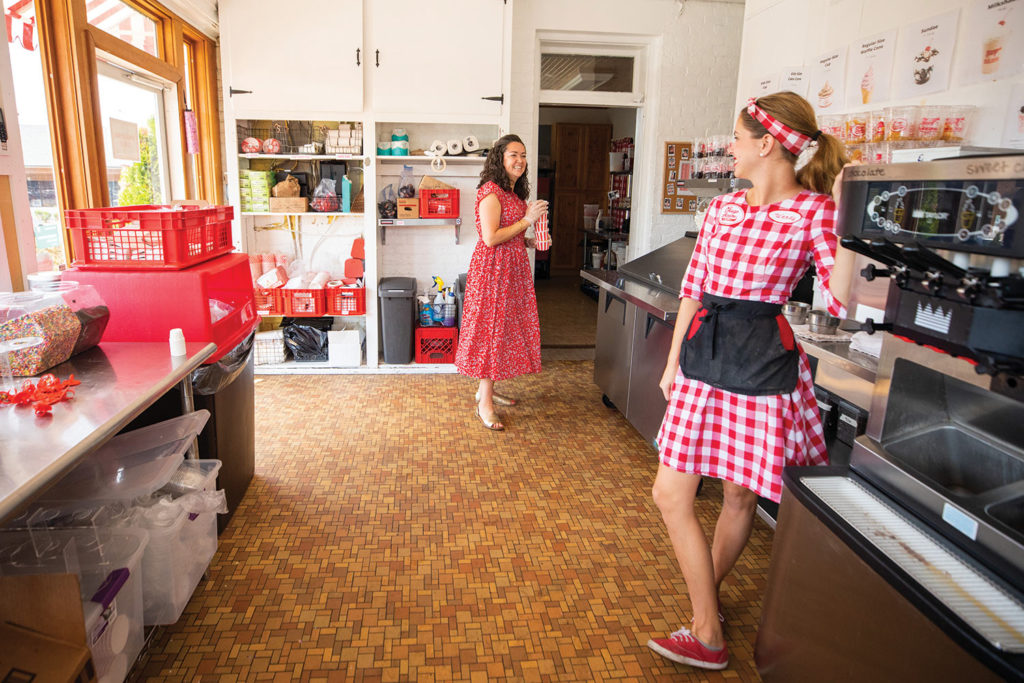
Colleen Cruze talks with Wendy Settle, the manager of the Asbury Road ice cream shop.
Besides finding ways to help them grow, Cruze works with employees to host percentage nights that support campus organizations and departments and help fund scholarships. Cruze Farm Dairy has helped raise money for sororities; the student Indian-American Association; Best Buddies, a student organization that fosters one-to-one friendships between people with and without intellectual and developmental disabilities on campus; and community organizations like Muse Knoxville. Cruze has returned to campus as a commencement speaker for the Herbert College of Agriculture and regularly judges the Graves competition.
She has a mentoring mentality. One of the beauties of Colleen is the insight she has into human nature and how she can help people.”
In 2018, Cruze and Gemma Pierce (’21), a nursing graduate and longtime employee, worked together to debut the new flavor Be Happy! Pink Sweet Cream during Breast Cancer Awareness Month. It was dedicated to the memory of Pierce’s mother, who had died of breast cancer three years earlier. To help spread awareness, they organized giveaways and information sessions on campus. Proceeds from in-store sales were donated to UT Medical Center’s Breast Health Outreach program, the Susan G. Komen Foundation, and the American Cancer Society.
Students with family histories of breast cancer stopped by the stand to ask questions and learn what preventative steps they could take. Others were just having a bad day, noticed the Cruze Farm uniform, and stopped by for a free treat.
“Either way, we were out there making an impact through ice cream,” Pierce says.

Manjit Bhatti and Colleen Cruze with their four children (from left): William (5), Coleman (1), Amery Frances (7), and Oliver (8 months).
Will greater impact require a larger footprint throughout the city or state? Cruze and Bhatti aren’t sure. “What’s funny is, we’ve grown our locations, but what we’re doing at the farm is very much the same way it’s been for a long time,”
Cruze says.
Their oldest child is seven years old, and the second is five. They run around the farm and do what they can to help their parents. It’s possible that, like their mother, they’ll inherit what their parents are building.
“I don’t know any parent that wouldn’t secretly dream of all their kids holding hands and one day running the business together without any conflict,” Bhatti says. “Obviously, that would be impossible.”
There Cruze stops him. Because she’s seen impossible come true before. Looking up into the wide-open spaces as a girl, she dreamed she might one day be here: back on the farm, working in the business with her husband and kids. And it became her reality.
“I actually think that it’s all possible,” she says with a smile. ![]()


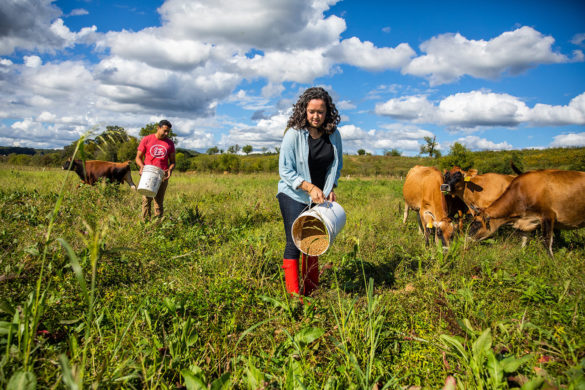
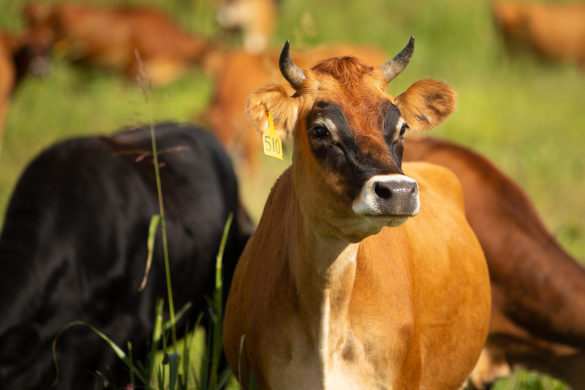
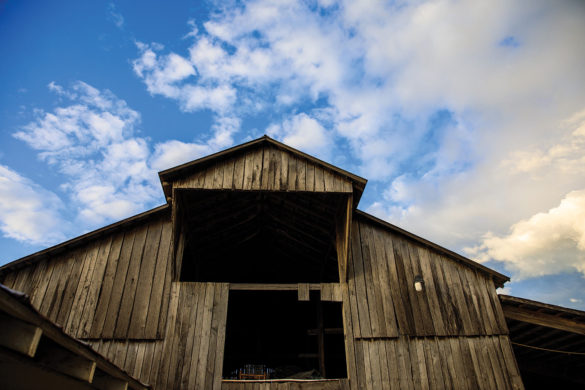
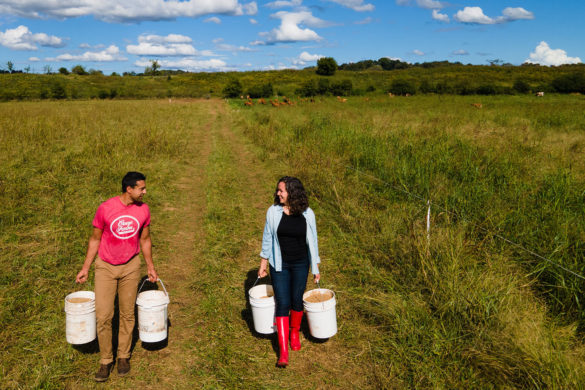

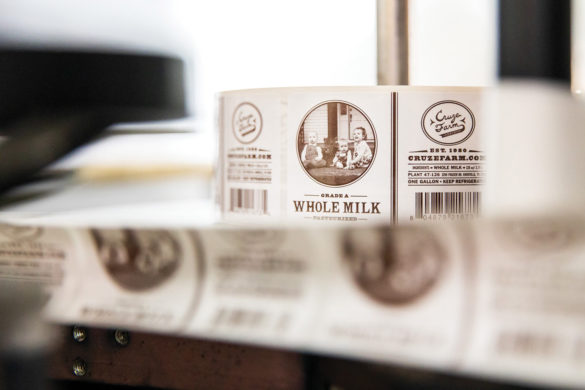
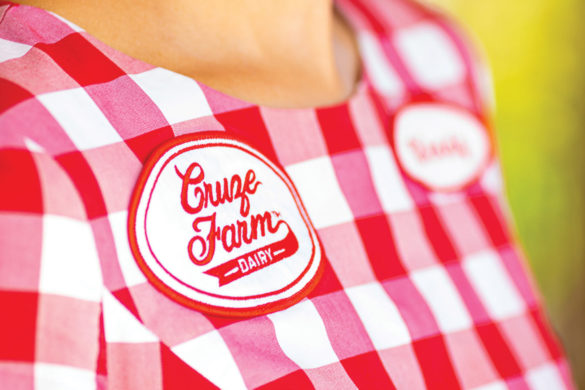
1 comment
How to I apply for the business grant of $5000? I am an alumni and created and5run a non-profit, Equity Project, to serve under-served populations of people. We typically work in high povery schools for free.